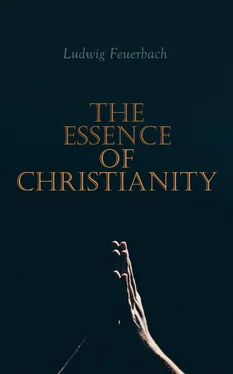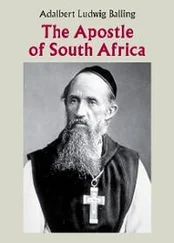This philosophy has for its principle, not the Substance of Spinoza, not the ego of Kant and Fichte, not the Absolute Identity of Schelling, not the Absolute Mind of Hegel, in short, no abstract, merely conceptional being, but a real being, the true Ens realissimum —man; its principle, therefore, is in the highest degree positive and real. It generates thought from the opposite of thought, from Matter, from existence, from the senses; it has relation to its object first through the senses, i.e. , passively, before defining it in thought. Hence my work, as a specimen of this philosophy, so far from being a production to be placed in the category of Speculation,—although in another point of view it is the true, the incarnate result of prior philosophical systems,—is the direct opposite of speculation, nay, puts an end to it by explaining it. Speculation makes religion say only what it has itself thought, and expressed far better than religion; it assigns a meaning to religion without any reference to the actual meaning of religion; it does not look beyond itself. I, on the contrary, let religion itself speak; I constitute myself only its listener and interpreter, not its prompter. Not to invent, but to discover, “to unveil existence,” has been my sole object; to see correctly, my sole endeavour. It is not I, but religion that worships man, although religion, or rather theology, denies this; it is not I, an insignificant individual, but religion itself that says: God is man, man is God; it is not I, but religion that denies the God who is not man, but only an ens rationis ,—since it makes God become man, and then constitutes this God, not distinguished from man, having a human form, human feelings, and human thoughts, the object of its worship and veneration. I have only found the key to the cipher of the Christian religion, only extricated its true meaning from the web of contradictions and delusions called theology;—but in doing so I have certainly committed a sacrilege. If therefore my work is negative, irreligious, atheistic, let it be remembered that atheism—at least in the sense of this work—is the secret of religion itself; that religion itself, not indeed on the surface, but fundamentally, not in intention or according to its own supposition, but in its heart, in its essence, believes in nothing else than the truth and divinity of human nature. Or let it be proved that the historical as well as the rational arguments of my work are false; let them be refuted—not, however, I entreat, by judicial denunciations, or theological jeremiads, by the trite phrases of speculation, or other pitiful expedients for which I have no name, but by reasons , and such reasons as I have not already thoroughly answered.
Certainly, my work is negative, destructive; but, be it observed, only in relation to the un human, not to the human elements of religion. It is therefore divided into two parts, of which the first is, as to its main idea, positive , the second, including the Appendix, not wholly, but in the main, negative ; in both, however, the same positions are proved, only in a different or rather opposite manner. The first exhibits religion in its essence , its truth , the second exhibits it in its contradictions ; the first is development, the second polemic; thus the one is, according to the nature of the case, calmer, the other more vehement. Development advances gently, contest impetuously; for development is self-contented at every stage, contest only at the last blow. Development is deliberate, but contest resolute. Development is light , contest fire . Hence results a difference between the two parts even as to their form. Thus in the first part I show that the true sense of Theology is Anthropology, that there is no distinction between the predicates of the divine and human nature, and, consequently, no distinction between the divine and human subject : I say consequently , for wherever, as is especially the case in theology, the predicates are not accidents, but express the essence of the subject, there is no distinction between subject and predicate, the one can be put in the place of the other; on which point I refer the reader to the Analytics of Aristotle, or even merely to the Introduction of Porphyry. In the second part, on the other hand, I show that the distinction which is made, or rather supposed to be made, between the theological and anthropological predicates resolves itself into an absurdity. Here is a striking example. In the first part I prove that the Son of God is in religion a real son, the son of God in the same sense in which man is the son of man, and I find therein the truth , the essence of religion, that it conceives and affirms a profoundly human relation as a divine relation; on the other hand, in the second part I show that the Son of God—not indeed in religion, but in theology, which is the reflection of religion upon itself,—is not a son in the natural, human sense, but in an entirely different manner, contradictory to Nature and reason, and therefore absurd, and I find in this negation of human sense and the human understanding, the negation of religion. Accordingly the first part is the direct , the second the indirect proof, that theology is anthropology: hence the second part necessarily has reference to the first; it has no independent significance; its only aim is to show that the sense in which religion is interpreted in the previous part of the work must be the true one, because the contrary is absurd. In brief, in the first part I am chiefly concerned with religion , in the second with theology : I say chiefly , for it was impossible to exclude theology from the first part, or religion from the second. A mere glance will show that my investigation includes speculative theology or philosophy, and not, as has been here and there erroneously supposed, common theology only, a kind of trash from which I rather keep as clear as possible, (though, for the rest, I am sufficiently well acquainted with it), confining myself always to the most essential, strict and necessary definition of the object, and hence to that definition which gives to an object the most general interest, and raises it above the sphere of theology. But it is with theology that I have to do, not with theologians; for I can only undertake to characterise what is primary ,—the original , not the copy, principles , not persons, species , not individuals, objects of history , not objects of the chronique scandaleuse .
If my work contained only the second part, it would be perfectly just to accuse it of a negative tendency, to represent the proposition: Religion is nothing, is an absurdity, as its essential purport. But I by no means say (that were an easy task!): God is nothing, the Trinity is nothing, the Word of God is nothing, &c. I only show that they are not that which the illusions of theology make them,—not foreign, but native mysteries, the mysteries of human nature; I show that religion takes the apparent, the superficial in Nature and humanity for the essential, and hence conceives their true essence as a separate, special existence: that consequently, religion, in the definitions which it gives of God, e.g. , of the Word of God,—at least in those definitions which are not negative in the sense above alluded to,—only defines or makes objective the true nature of the human word. The reproach that according to my book religion is an absurdity, a nullity, a pure illusion, would be well founded only if, according to it, that into which I resolve religion, which I prove to be its true object and substance, namely, man ,— anthropology , were an absurdity, a nullity, a pure illusion. But so far from giving a trivial or even a subordinate significance to anthropology,—a significance which is assigned to it only just so long as a theology stands above it and in opposition to it,—I, on the contrary, while reducing theology to anthropology, exalt anthropology into theology, very much as Christianity, while lowering God into man, made man into God; though, it is true, this human God was by a further process made a transcendental, imaginary God, remote from man. Hence it is obvious that I do not take the word anthropology in the sense of the Hegelian or of any other philosophy, but in an infinitely higher and more general sense.
Читать дальше












